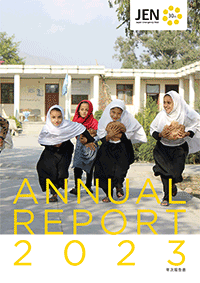Toward improving sanitary conditions; first women-only laundry
According to UNHCR, the number of Syrian refugees fled to neighboring countries or North African nations has exceeded 500,000 (as of December 11). More than 500 refugees are arriving at the Zattari camp each day, the largest refugee camp in Jordan where JEN is operating. Although many organizations including U.N. are being involved in helping refugees, their efforts fall behind the need for various forms of aid to rapidly growing refugees. In particular, the issue of unsanitary water environment is considered to be the top priority by support organizations because it will directly affect the health of children and the aged who are vulnerable to infection.
【Children come to a water tap station to drink water.】

【Desert sand doesn’t absorb water. A water-soaked-drain-less tent】

There is an awful lot of need for measures to improve the unsanitary water environment in the camp. As part of a practical approach to improving the environment, first JEN is going to set up women-only common laundries (30 installations) in the camp.
【A JEN staff member questions a women doing the laundry at a toilet about need for water sanitation.】

At present women do the laundry at hand-washing stations attached to toilets. But they also wash dishes, pots and pans, and food there, because of that it is feared that the laundry wastewater could contaminate water for washing hands, dishes and so forth. Not only that results both from a survey in the camp and information-sharing with other organizations showed that for many women washing and hanging out underclothing in the public is a big source of stress resulting from difference in culture.
【A woman does the laundry before her tent using water from a water station. A familiar sight in the camp】

JEN is going to set up a facility exclusively for laundry in every brick-walled compound of common water point (a common water facility where toilets, showers and water tap stations have been set up). At the same time JEN is going to hand laundry kits (containing detergent, clothespins, clotheslines and so on) to 4,000 families to promote the use of the facility. If women use the facility as a place where they mix freely with each other while doing the laundry, it could also help revitalize their community. Refugees in the camp are facing a number of problems with water supply, drainage, garbage and so on. In order to improve unsanitary water improvement, it’s necessary not only to set up facilities needed urgently, but also to raise personal hygiene awareness. From now, JEN will challenge to respond effectively to the need of improving sanitary environment to aid living conditions of refugees.

![Jordan[Syrian refugees] Blog](/en/project/images/mainimg_project_jordan.jpg)




